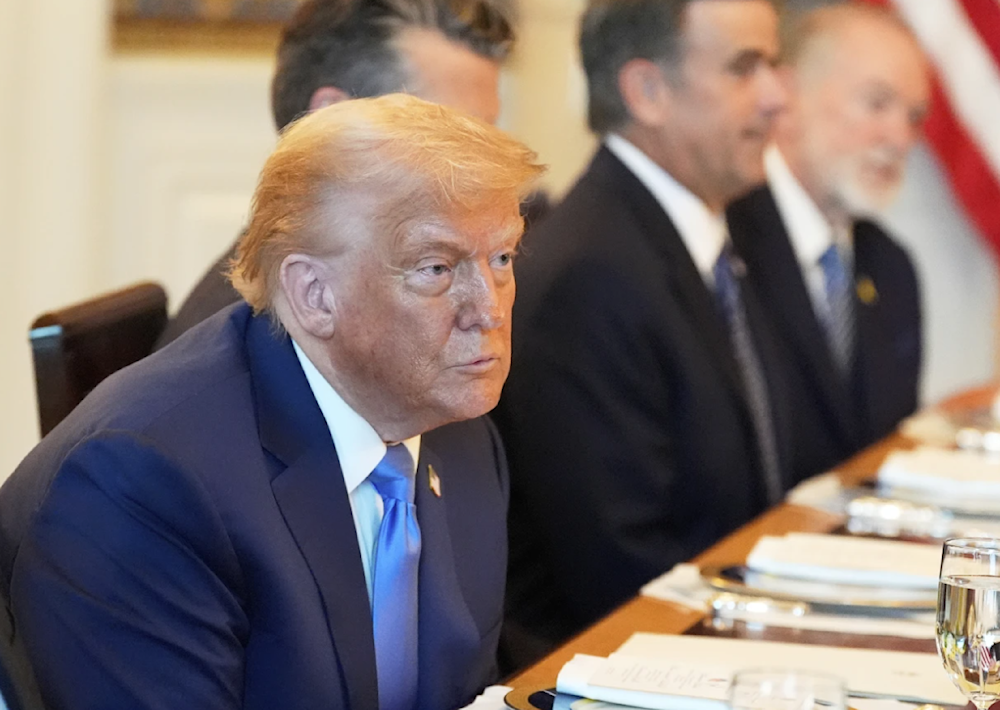Playing bomb card again, Trump would back new Israeli strikes on Iran
Although "Israel" may not seek direct approval from the US to strike Iran, Netanyahu could face pushback from Trump, who is keen on maintaining diplomatic channels with Tehran.
-

US Secretary of State Marco Rubio, President Donald Trump, Defense Secretary Pete Hegseth, and US Ambassador to "Israel" Mike Huckabee listen during a meeting with Israeli Prime Minister Benjamin Netanyahu in the Blue Room of the White House, on July 7, 2025, in Washington (AP)
During a meeting with Israeli Prime Minister Benjamin Netanyahu at the White House on Monday, US President Donald Trump expressed his hope that there would be no further US military action against Iran, stating, “I can’t imagine wanting to do that.”
However, Netanyahu privately informed Trump that if Iran resumed its pursuit of a nuclear weapon, which was never proven to begin with, "Israel" would consider additional military strikes, senior American officials told The Wall Street Journal.
Trump, while advocating for a diplomatic resolution with Tehran, did not oppose "Israel's" stance.
Their discussions highlighted the differing strategies of the US, "Israel", and Iran following recent attacks on Iran’s nuclear sites by the US.
Trump is relying on the threat of further military action to pressure Iran into a nuclear agreement, while "Israel" remains skeptical that diplomacy will prevent Iran from secretly advancing its nuclear ambitions, according to the WSJ.
Trump 'doesn't care' about assessment that Iran isn't pursuing nukes
This is the case, although Trump, prior to the unprovoked Israeli war on Iran, openly rejected a key intelligence assessment that Iran isn't after any nuclear weapons, instead aligning himself more closely with the Israeli occupation's aggressive stance.
The assessment, delivered in March by Director of National Intelligence Tulsi Gabbard, clearly stated that Iran is not currently developing a nuclear weapon and that Leader Sayyed Ali Khamenei has not reauthorized any weapons program since suspending it in 2003.
However, as Trump was faced with the findings, he dismissed them, despite coming from the very intelligence chief he appointed. “I don’t care what she said,” Trump remarked at the time.
Meanwhile, Tehran, which repeatedly insisted on the peaceful nature of its nuclear program, is now demanding assurances that it won’t face more military strikes if it resumes talks with Washington.
Although "Israel" may not seek direct approval from the US to strike Iran, Netanyahu could face pushback from Trump, who is keen on maintaining diplomatic channels with Tehran.
Read more: Trump, US intelligence split on Iran, Gabbard sidelined
Challenges in resuming negotiations
Iran’s President Masoud Pezeshkian, along with other top officials, has recently stated that Tehran is open to resuming nuclear talks with the US, but only if they receive assurances that no further attacks will occur during talks. Tehran will also insist on its inherent right to continue enriching uranium for peaceful purposes, of course.
Israeli officials now claim strikes have delayed Tehran's nuclear ambitions, although "Israel" claims some of Iran's stockpiles of near-bomb-grade enriched uranium at the Isfahan facility survived the strikes.
Pressures on Trump, 'Israel'
The danger for Trump, analysts suggest, is that "Israel" could essentially steer the next steps in the strategy against Iran.
“My sense is that Trump mostly wants the Iran problem to just go away,” said Gabriel Noronha, who worked on Iran policy during the first Trump administration. “He’s clear that there should be no enrichment or nuclear weapons. But he’s willing to be flexible on other things.”
Many experts believe that if Iran chooses to rebuild its nuclear program, it will likely do so covertly through undeclared, underground enrichment sites, rather than openly through known facilities.
“It was tough enough to achieve an agreement before the strikes. Now it will be tougher still,” said Dan Shapiro, a former US ambassador to "Israel", who also worked on Iran negotiations under the Biden administration. “Trump can’t back down on zero enrichment, and Iran will feel it can’t concede that as a result of being attacked.”
Ali Vaez, Iran project director at the Crisis Group, notes that the group of Iranian officials advocating for serious diplomatic negotiations has become a minority following these attacks, according to the WSJ. He points out growing distrust of Trump, with concerns that Washington’s objectives could shift unexpectedly. Seeking a deal at any cost, especially one that demands the end of Iran's enrichment program, seems increasingly unlikely, he adds.
Meanwhile, European governments have reiterated their threat to reimpose sanctions lifted under the 2015 nuclear deal unless Iran fully cooperates with the International Atomic Energy Agency (IAEA). An October deadline is approaching for Britain, France, and Germany to decide whether to reinstate these sanctions. In response, Iranian Foreign Minister Abbas Araghchi warned that Europe's insistence on the snapback mechanism would end its role in Iran's nuclear file, asserting that Iran's cooperation with the IAEA has not stopped, yet it has taken a new form.

 5 Min Read
5 Min Read










